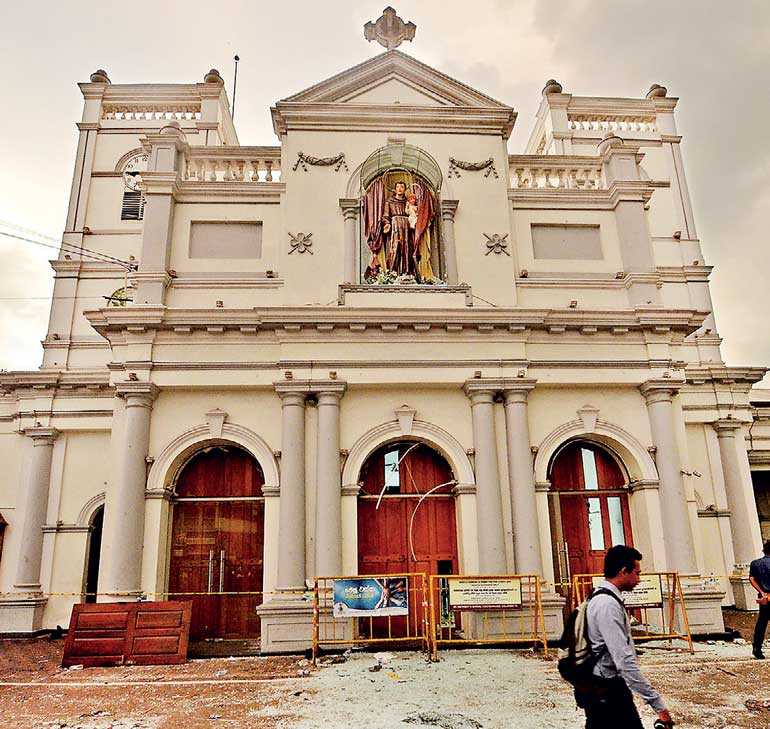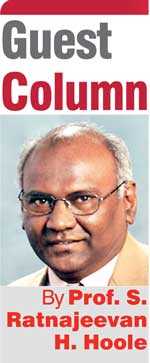Tuesday Feb 17, 2026
Tuesday Feb 17, 2026
Tuesday, 23 April 2019 00:00 - - {{hitsCtrl.values.hits}}

The time calls for more than condemnation of the Easter Day bombings. It also calls for the protection of the innocent, whose only connection to the killers is a shared ethnicity
- Pic by Shehan Gunasekara
Yesterday was Easter Sunday; 227 persons [at the time of writing] have been killed, and many times more injured. The primary targets were churches and international hotels.
It seems clear that the extremist group ISIS (Islamic State of Iraq and Syria) has masterminded the attacks. Of some 35 persons arrested so far, all are Muslims save a Tamil driver. Jaffna-based reporters working on the story say some have been trained in the UK. 
Five are Pakistanis. One captured in Jaffna yesterday had a Pakistani flag tattoo on his body – it is said that the bomb he was to explode did not go off. As I write (4:30 p.m. 22 April), there has been another bomb in Kotahena – apparently it was set for yesterday in a car, and when it did not go off they had tried to remove it and it exploded during that process.
M.A. Sumanthiran, MP, is quoted in today’s Uthayan newspaper as saying on the authority of the Inspector General of Police that it is ISIS that was behind the attacks. The evidence we have seen so far supports that position.
Predictably there are many statements of condemnation of the murders. And rightly so. I join that condemnation without hesitation. I am, however, writing to highlight another important perspective that we must see. Larger, collective relations with Muslims have been difficult for Tamils and Sinhalese. It is partly because Muslims have been successful in many areas of work.
In Jaffna last year a function to commemorate the expulsion of Muslims from the Northern Province and to express solidarity with Muslims as they try to recreate life with us, was attended only by a few Tamils, all Christians besides a handful of Marxists. When I asked friends about standing shoulder to shoulder with Muslims who lost much through their expulsion, the retort was “What of the things they did to us in the East?” Sumanthiran, who has publicly apologised for the expulsion, continues to take heat for that apology and solidarity.
Yet, advances in Muslim-Tamil relations have been made, albeit slowly. Many Muslims are increasingly making Jaffna their home again to make Jaffna the beautiful cosmopolitan city that it once was. And now this! Already there are unconfirmed reports of a mosque in Puttalam being bombed. As a Tamil, I remember that every time the LTTE attacked Sinhalese civilians or even the army, we were subject to intimidation, assault, and even murder as if we were responsible.
In June of 1987 I was going by train from Colombo to Jaffna to escort back to the US my wife and two children who had gone on vacation in December 1986 and got stuck because of fighting. I was desperate because 4 June was my eldest girl’s birthday. Train service was sporadic and I got into a train on 5 June. I had to alight in Vavuniya and take a bus because the train service ended there. It was about 1 p.m. now and a curfew would be on from 6 p.m. We had five hours to get home.
It was, unfortunately for us passengers, the day new troops were sent from Vavuniya to Mankulam further north, and the replaced were marching back. We were held hostage and told in harsh words that if the returning troops were attacked by the LTTE, we would all be mowed down.
This is what I fear – the sins of a few members of a community being placed on the heads of the whole community. To truncate the story’s happy ending, the troops came back by 4 p.m. and our bus was released, and dared the curfew, getting us home by 8 p.m. I learnt that my absence on 4 June was compensated by the few packets of dhal and rice air-dropped by India into our home.
The point I make is this. I am a Tamil, and like most Tamils, was never responsible for the murder of President R. Premadasa or of any others who were assassinated by the LTTE, although I was very critical of the politics of such Sinhalese politicians. Likewise, most Sinhalese are not responsible for the 1983 riots and the atrocities perpetrated on Tamils since and before, even if many Sinhalese thought Tamils had no business living in Colombo after voting for federalism
However, if I am blamed for President Premadasa’s death and murdered for it as a Tamil, or if I advanced the execution of an innocent, disconnected Sinhalese, seeking vengeance for the 1983 riots – that would be murder, even terrorism.
The time calls for more than condemnation of the Easter Day bombings. It also calls for the protection of the innocent, whose only connection to the killers is a shared ethnicity.